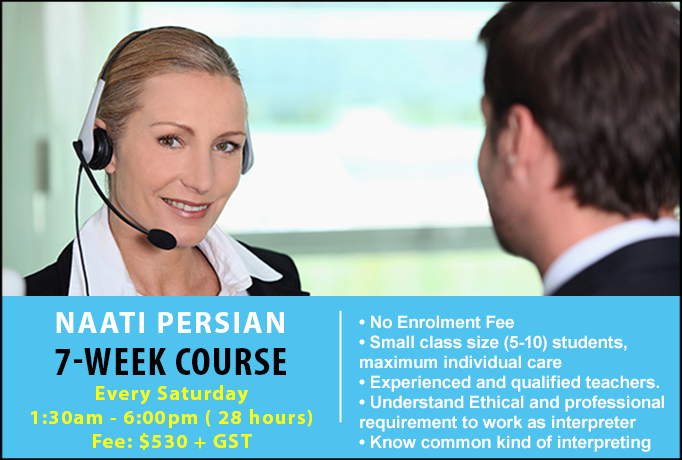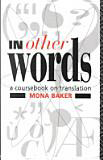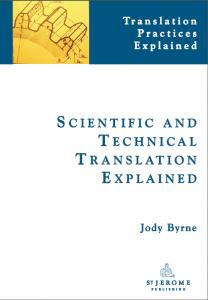
NAATI INTERPRETING (ENGLISH Persian) COURSE
Students will be provided with important theories, techniques and strategies to pass the NAATI Test in a NAATI Preparation Course.
What we will cover
- In this NAATI Preparation Course/Workshop for English-Persian, we will train you very specifically with more examples from your native language.
- All the example and demonstrations will be in your languages, so you can easily understand the explanation of all types of possible errors in interpreting.
- You are expected to have a very high level of competency in English as well as your language. We can only help you with the comprehension errors of the source speech and the possible interpreting techniques to convey that sense of meaning. We cannot provide you with the grammatical and linguistic knowledge of your own native language.
Marking Guidelines
- You will be taught and provided with a marking list displaying all common errors in interpreting with code (A, B, C, D, etc.) in all your lessons.
- The trainer can give a very short suggestion for students to improve students’ interpreting.
Course Content:
- Ethics and requirement in working as a paraprofessional interpreter in Australia
• Some common types of interpreting errors in interpreting from English to Persian
• Some major techniques to convey one source speech from one language to the target speech in another language
• Students will get at least 1 mock test per week (similar to the real examination) and will receive teacher’s feedback
Course Objective:
- Students will know the ethics and professional requirement to work as a paraprofessional interpreter in Australia.
• Students will understand some major techniques to convey one source speech from one language to the target speech in another language
• Students are provided with knowledge about common types of interpreting errors to avoid making them in NAATI Test
Who should attend?
- University Students who want to gain a better understanding about interpreting in Persian
• University who intend to take a NAATI Test and have a rough understanding about the test
• Persian interpreter researcher/tutor
Requirement: Current IELTS speaking score ≥ 6.5
Duration:
7 weeks, 1 day per week, each class lasts 5 hours on Sunday from 12:00pm-05:30pm
When:
(Once per week) Saturday 6 June 2015 from 1:00pm-06:00pm *Open for Enrolment
Where:
Suite 202, 332 Pitt St, Sydney 2000
Class size: 4 – 8 Students
Fee: $530+GST (including training materials, 35-hour class)
Detailed program:
Week 1-4
- Ethics and standards in interpreter professions – Review some key grammatical points in English which may affect your interpreting.
- Major interpreting techniques (in English) and examples of these interpreting technique (in Persian)
- Major interpreting techniques (in English) and examples of these interpreting technique (in Persian) – CONTINUED
Week 5-7
- Interpreting process and possible errors (comprehension errors, linguistic errors, translation errors) in each process
- All possible types of interpreting errors (explanation in English and examples of errors in Persian)
- Review and FAQs
![]()
![]()
![]()
Book Online with your details and pay $530+GST by Cash, Cheque or Direct Deposit to SLS bank account. Please contact us at info@sydneylanguagesolutions.com.au or call us at 02 9283 9892 for more information
“Thank you for everything! I like the fact that I could ask questions specific to the test
format and conditions in the workshop!”
(NAATI Translation & Interpreting Workshop Participant – September 2012)
“It was a good workshop. Na is a very good teacher!” (NAATI Translation & Interpreting
Workshop Participants – September 2012)
“This workshop is a pathway to the test and I found it to be very helpful!” (NAATI
Translation & Interpreting Workshop Participants – September 2012)
“I came from Canberra to Sydney on Monday and attended your class. It was very
useful and you are one of the best teachers I ever met. It was easy to learn from
you. Thank you.” (Liliana Bogatko – March 2013)
“Extremely good materials were provided. The trainer gave good explanation!”
(NAATI Interpreting Workshop Participants – April 2013)
“The workshop was very informative and the tutor was very knowledgeable.”
(NAATI Interpreting Workshop Participants – April 2013)
“Very useful information, more than my expectation. Very good teaching materials.”
(NAATI Interpreting Workshop Participants – April 2013)
“There was a lot of information about NAATI specifics and practical information given.”
(Andreas Steinwachs – May 2013)
“I liked all of the feedback and the experienced tutor” (Minh Phuong Nguyen – May 2013)
“The tutor was very clear, very detailed. I really enjoyed it. The tutor is energetic.” (Tuan Tio – May 2013)
“The workshop covered all relevant topics. All questions were answered.” (Pari Nathan – May 2013)
“Excellent Course. A lof of topics coverered in just seven hours.” (Fazel Rahman – July 2013)
“I really liked the class, amazing teacher, she gives nice tips.” (Deepshikha Mehta – July 2013)
“I like the class, it is really helpful. Thanks!” (Ali Reza Baturi – July 2013)
“Excellent preparation!” (Thanh Minh Uyen Luu – July 2013)
“The workshop was good in terms of informative material and motivated coach (Anne Ma). I would definitely recommend this course to friends who want to know about NAATI” (Vinh Loc Phung – July 2013)
“It is a very good course. The part about cultural aspects of interpreting is very useful.” (Yan Li – September 2013)
“The quality of the workshop is really rich and informative. I really like the presenter. I appreaciate the presenter’s passion about the workshop. It is very useful and informative. Thanks. ” (NAATI Interpreting Workshop Participants – September 2013)
“Thank you to the presenter as she drew our attention to some practical knowledge of translation errors. Many valuable skills!” (Wasan Odeh – September 2013)
Adel Mohamed
Adel MOHAMED is one of the most respected names in the field. He acquired NAATI level three by sitting for NAATI exam directly in 2004. Adel is one of a handful – in Australia- of top notch booth interpreters who has done many simultaneous interpreting in Australia, Qatar, Hong Kong and other countries, in addition to his vast experience that spans for more than ten years in legal, medical and community interpreting. Adel has a Bachelor degree of English Literature and Education in addition to advanced diploma in interpreting among other qualifications.
1. In other words: Another Course in Translation: This bestselling Coursebook addresses the need for a systematic approach to training in translation studies by drawing on key areas in modern linguistic theory and relating them systematically to a number of translation problems and strategies. The strategies are identified by an examination of authentic examples of translated texts in a variety of languages. No knowledge of linguistics or foreign languages is assumed. Each chapter begins with an explanation of the key linguistic concepts referred to and ends with a series of practical exercises.

2. Scientific and Technical Translation Explained; A Nuts and Bolts Guide for Beginners. Using a combination of interdisciplinary research, real-world examples drawn from professional practise and numerous learning activities, Scientific and Technical Translation Explained equips you with the knowledge and skills you need to get started in this exciting and challenging field.
NAATI is the National Accreditation Authority for Translators and Interpreters a
1. Does SLS provide training in NAATI preparation courses for interpreting?
At the moment we provide both the training for translation and interpreting. Besides, we also provide
*Preparation courses for Chinese, Vietnamese,
*NAATI Translation marking services for some languages (Korean, Portugese, Arabic, Spanish, Mandarin, Japanese, Vietnamese) and
*6-hour Preparation Workshops for the interpreting/translation test for all languages.
2. Does the Translation Workshop focus more on theories or practical exercises to improve translation techniques?
The course time is divided equally between translation theories and practising translation skills.We believe that a sufficient knowledge of translation errors will help you to avoid these errors in translating and a good understanding of translating techniques will provide you with different tips and techniques to translate correctly.
3. Does Interpreting Workshop focus more on interpreting techniques, questions for cultural proficiency or on
practical exercises to improve interpreting techniques?
The course time is divided equally between interpreting theories and practising interpreting skills in pairs with practising transcripts.We believe that a sufficient knowledge of cultural competence and interpreting techniques will help you to improve your interpreting skill. Our workshop will provide you with different practise trascripts, tips and techniques to have confidence public speaking as well as interpreting skill.
4. Can I just submit my assignment for marking without attending class?
Yes, you can still submit the assignment for marking without attending class. The fee is $350 for the marking of two NAATI Practice Mock Tests (which have a similar format as the real NAATI test) and four translation assignments from English to your native language. The assessors are NAATI-accredited.
Please read our instructions carefully regarding the submission of your assignments and retaining your receipt HERE.
5. Can I book the NAATI-accredited trainer to ask some questions if I only use the assignment marking package?
Yes, you can book the tutor for the fee of $60 per hour to go through your essay (only available for Arabic, Vietnamese, Chinese, Korean and Japanese at the moment).
6. Are the classes conducted in my native language or in English?
In all cases, including your assignments, you will be asked to interpret/translate from English into your native language.
The amendments and comments on your assignment will be given by our NAATI-accredited assessors in English, that is to say, all the training will be in English.
However, in language-specific 18-hour NAATI preparation courses, your trainer will also speak the same native language as you so that you will be able to get extra help if you are not sure of certain expressions in your own language. She/he will also suggest some alternative answers in your native language if there are any errors in your translation.
For example, in the Chinese NAATI preparation courses, most examples will be given in Chinese (your native language) and in the Vietnamese NAATI preparation courses, the examples of translation errors will be given in Vietnamese.
In General Language 6-hour NAATI preparation workshops for all languages that we may organise every two months, we do not specialise in one language. The trainer will speak and train in English; however, the examples of most translation errors will be given in different languages i.e. Arabic, Chinese, Korean, and Vietnamese.
7. What level of language proficiency should I have?
You should have very advanced levels in both languages, not only in English comprehension but also in your native language.
8. Should I take the Translation or Interpretation Test?
If you are good at writing and your native language, you should take the NAATI Translation Test. If you are more confident with public speaking, note taking and are fluent in your language (and English speaking), you should consider NAATI Interpreting Test.
However, please be reminded being a bilingual does not mean you can immediately become a good translator or interpreter.
9. Do I receive a certificate at the end of the course?
We don’t issue a certificate or diploma which will help you with your visa application, but we do issue a Certificate of Participation. The aim of the course is to help you prepare for the actual NAATI test.
10. Why should I study with Sydney Language Solutions?
We are a translation company, so we can provide you with real translation techniques and experiences
– We have a group of professional teachers who are NAATI-accredited.
– We design the mock tests and assignments to help you familiarise yourself with the exam structure.
– We provide precise and focused translation techniques,
– We provide supporting exercises, mock test and a vocabulary list to help you build up your translation skills.
– We are conveniently located in the Sydney CBD.
– We offer a very reasonable price and free training material
11. What is the purpose of the program? a
The program is designed to help university students or other English language learners to know the ethics and professional requirement to work as a professional translator in Australia. Students will understand some major techniques to convey one source text from one language to the target text in another language. Students are provided with knowledge about common types of translation errors to avoid making them in NAATI Test
12. What is the English level required for the students of the program?
We recommend you should only join this workshop if your current IELTS Score in Speaking & Listening is at least 6.5 or 7 marks.
13. Who is suitable to enrol the program?
For those who have achieved 6.5 or 7 in IELTS, this will be an especially suitable program for you. This workshop is also suitable for university students who want to gain a better understanding about translation or students who intend to take a NAATI Test and have a rough understanding about the test.
14. What is the content of the program?
The program is a very student-oriented and flexible language program. Besides the essential Ethics and requirement in working as a professional translator in Australia which will surely be covered in the program, the program will also cater for students’ common types of translation errors in translating from English to another language depending on the time and resources available. Moreover, the workshop will introduce some major techniques to convey one source text from one language to the target text in another language.

